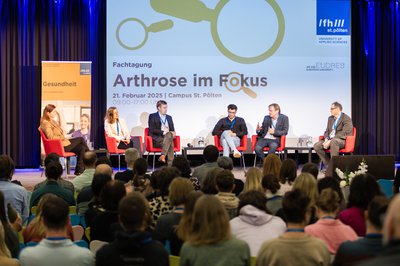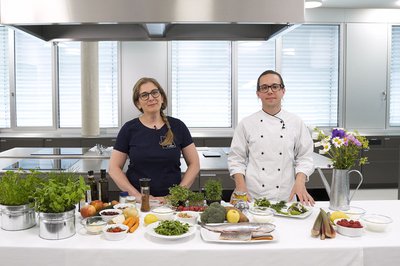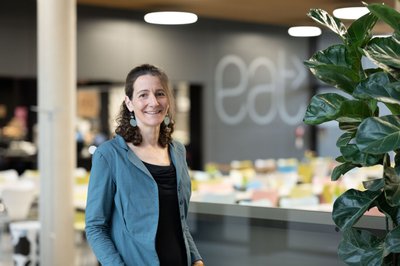Dietetics
Bachelor programme
More courses from the department
Health SciencesThe Role of Nutrition in Medical Therapy
Healthy nutrition and the targeted application of nutritional therapy is becoming increasingly relevant in all medical disciplines. The bachelor degree in Dietetics provides you with well-founded knowledge in the areas of prevention and nutritional therapy, counselling and communication, as well as with research and management skills.

News

Spotlight on Arthrosis
St. Pölten UAS Held First Symposium and Info Day on the Topic of Arthrosis

Anti-Inflammatory Diet against Arthritis
From the Science Lab to the Plate: Project Develops Recipes for “Arthritis Cuisine”

Making Our Nutrition Sustainable
Study and Recommendations on Measures for a Sustainable Nutrition Policy
FAQ
How can I become a dietitian?
As a graduate of the UAS bachelor degree programme Dietetics, you graduate with the academic degree Bachelor of Science in Health Studies (BSc) and are, as such, entitled to practice a legally recognised health profession.
What distinguishes dietitians from these other nutrition-related professions?
Dietetics is a three-year course of study at the higher education level. Based on their theoretical and practical education, dietitians are able both to treat patients suffering from various illnesses (e.g., diabetes, allergies, malnutrition, obesity) and to pursue an activity in health promotion and disease prevention.
In Austria, the profession of dietitians is regulated by the MTD Act (the federal law governing the medical-therapeutic-diagnostic healthcare professions) which defines the education, fields of activity, professional duties, and professional law aspects.
Nutrition consultants, trainers, and coaches generally complete a short training offered by various providers and can thus work in health provision. There is no uniform regulation or protected professional designation that applies. As a matter of principle, the personalised, individual counselling of persons is reserved to dietitians.
Which health facilities are eligible for completing my vocational internship?
You can complete your internship at the following health facilities:
- University clinics and other hospitals
- Primary care centres
- Rehabilitation and health centres
- Geriatric facilities (e.g., long-term care, acute geriatrics)
- Scientific expert societies
- With freelance dietitians
You can also opt for an internship in the food and pharmaceutical industries.
The twelve-week internship in the 6th semester allows you to select your individual focus areas in your studies and offers you the opportunity to complete an internship abroad as well. During this time, you can not only collect valuable professional experience but also establish contacts and build a network. International internships are eligible for funding within the Erasmus programme.
What are my career prospects after graduation?
Graduates of this programme have the option to
- counsel, accompany, and support individuals, groups, and institutions within the framework of nutritional health provision and nutrition therapy.
- translate scientific guidelines into dietary recommendations that are suitable for everyday life, while taking patients’ individual needs into account at the same time.
- translate recommendations regarding energy and nutrient supply into concrete foods, dishes, and preparation methods.
- design, execute, and monitor the dietetic process in an evidence-based manner.
- carry out education and information work in the field of nutrition-specific health promotion and disease prevention.
- continually promote and further develop the quality of this professional field.
Can I participate in real research projects during my bachelor studies?
Yes, students can become involved in ongoing research projects such as, e.g., the current research project NUMOQUA. The title stands for “Nutrition and Movement to Improve Quality of Life with Knee Osteoarthritis”, and it examines the effects of the programme “Good Life with Osteoarthritis”.
It combines movement therapy with a special dietary programme for patients suffering from osteoarthritis of the knee. Functional parameters and inflammatory status are examined and evaluated alongside quality of life.
As a student, you are involved in the research and can actively participate in the development of a special nutrition programme.